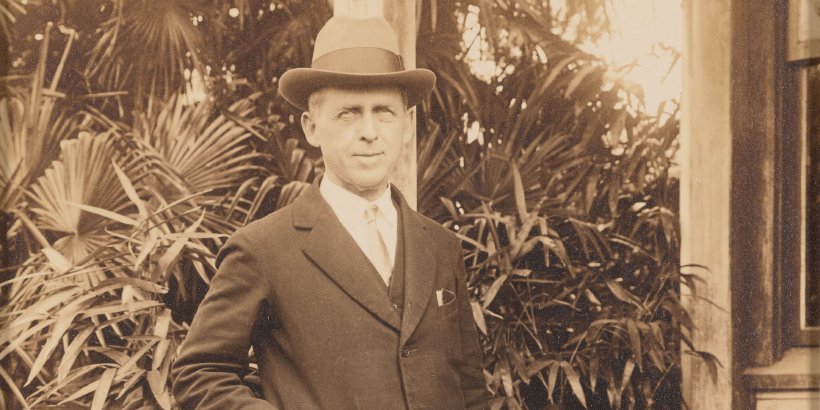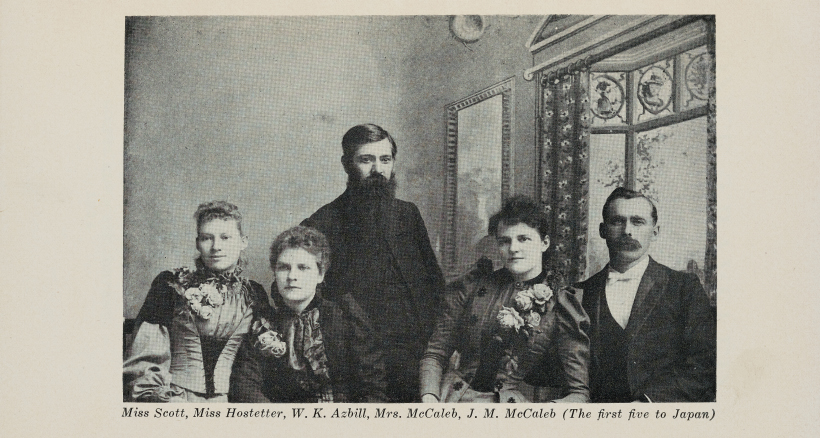Newly Published J.M. McCaleb Papers Highlights Missionaries’ Service to the Church in Japan

John Moody McCaleb, a young preacher from the Stone-Campbell Restoration Movement, and his wife Della sailed for Japan in 1892. Newly wed and newly inspired for the Christian mission that awaited them there, they could hardly have imagined how their lives would be shaped and formed by nearly 50 years of service to the church in Japan. Their story is documented in the newly published digital collection, J.M. McCaleb Papers at Pepperdine Libraries.
At the time of their marriage just a few months earlier, there was no contemplation of such a journey. In his 1934 memoir, Once Traveled Roads, McCaleb wrote, "I believe the call to go to Japan was of God." And when the correspondence about a mission to Japan began between the McCalebs and W.K. Azbill, "there were two of us to make [the decision]," noted McCaleb. Azbill had previously served as a missionary to Jamaica for ten years. He believed it was important for the Churches of Christ to support missions. He recruited the McCalebs based on the recommendation of Robert Graham, president of the College of the Bible in Lexington, Kentucky where McCaleb had trained.
The young couple knelt in prayer "more than once" to ask for strength and guidance in the decision. "Both were given," remarked McCaleb. McCaleb reflected that the whole course of his life was determined by his wife's willingness to work in Japan and wondered aloud whether the mission effort would have ever been a reality without it.

David Lipscomb, founder of Lipscomb University, was an early supporter of the McCaleb mission to Japan. Understanding the importance of Della McCaleb's embrace of the mission and her role in the project, Lipscomb gifted her a copy of Wilmore's Analytical Reference Bible and wrote on the blank leaf:
Presented to Mrs. Della M. McCaleb on her departure to Japan to teach Christ to the people of that land, with the earnest prayer that our Father will bless her and her husband in their work, that a great door and effectual may be opened unto them to preach the gospel to the people to whom they go, and that many souls may be saved through their labors; and that God will bless them in their work, that he will preserve them from all bodily harm and danger, that he will keep them faithful and true to him, and that he will keep them unto his own heavenly kingdom.
Feb. 15, 1892 DAVID LIPSCOMB
The McCalebs' Bible is preserved in Pepperdine's Special Collections and Archives and available as a part of the digital collection. Further inscriptions in the book's pastedown reveal the Bible's journey to Pepperdine Libraries and document McCaleb's return to Southern California and George Pepperdine College in 1941, where he taught as a professor of Asian religion studies in the later years of his life.
The J.M. McCaleb digital collection also contains McCaleb's writing and correspondence about the effort to support conscientious objectors during World War II. For McCaleb, pacifism was a closely held conviction, no doubt influenced by the early death of his father, also a pacifist, who was mistakenly killed by a fellow Union soldier during the Civil War. McCaleb penned and published many persuasive articles and mission updates in periodicals associated with the Churches of Christ, such as Gospel Advocate and Christian Leader and the Way.
Included among the Japanese documents in the collection are sermons written by McCaleb in his early efforts to preach in Japanese. In the later years of McCaleb's mission to Japan, he established a school at Zoshigaya, which he described in great detail in a typewritten essay. Though Della and their three children eventually returned to the United States permanently for the children's schooling, McCaleb stayed in Japan. He made visits to see his family as often as possible while on furlough in the U.S. He also used furloughs to visit many churches in the U.S., preaching and teaching that each congregation should feel a burden to supply missionaries and to establish missions in foreign lands.
In 1941, when war between the U.S. and Japan was inevitable, the American Consulate General in Tokyo sent American missionaries home. Before he left Japan for the last time, the 80-year-old McCaleb penned a poem titled "Ode to Cherry Blossoms." Although McCaleb's health declined and he was never able to return to Japan, it seems he was satisfied that he had fulfilled his purpose. In looking back over his life, McCaleb considers the whole. "If life could be lived again, I would write the same life's book,...in some places I would change some things, make additions here, strike out something here." But all in all, he said, "I do not think of any course in which I might have done better."
J.M. McCaleb lived to age 92 and is buried in Inglewood, California.